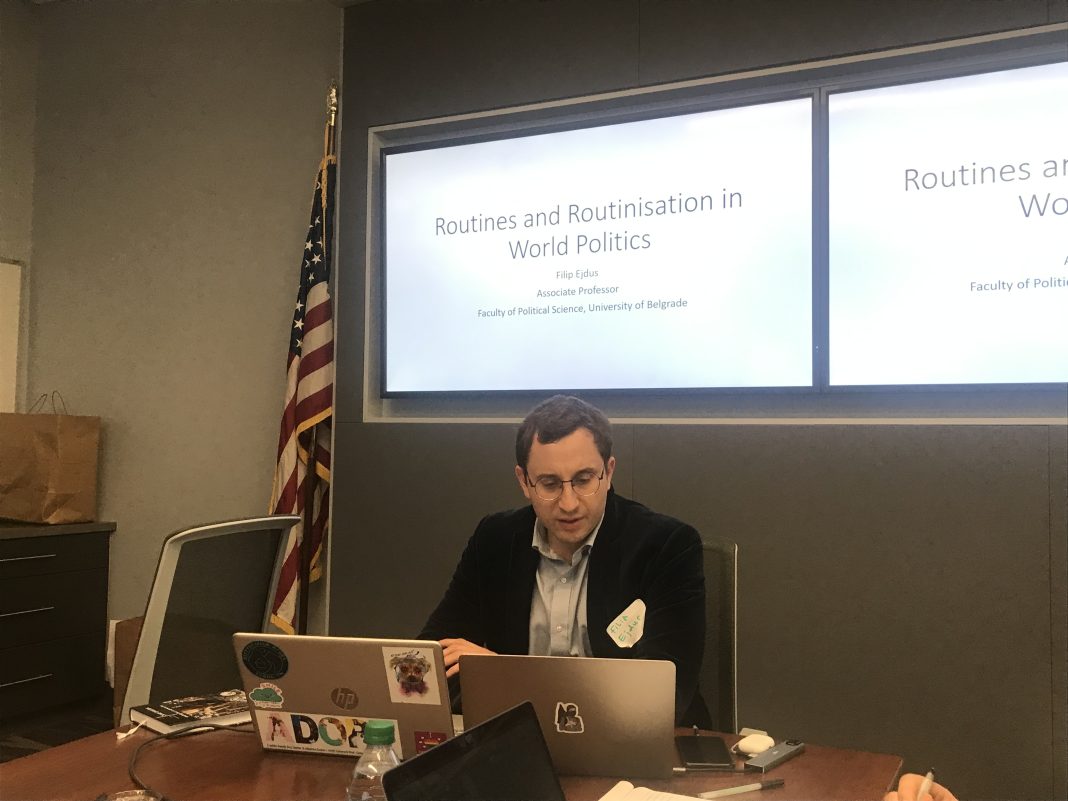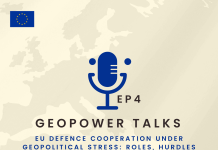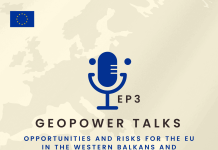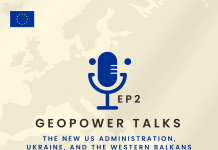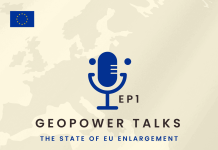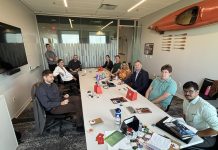Dr Filip Ejdus, Head of the Centre for International Security, MA Tijana Rečević, Researcher at the Centre for International Security, and Dr Milan Krstić, Assistant Professor at the Faculty of Political Science, participated in the April research symposium on routines in International Relations at the Ohio State University, sponsored by the Serbian Educational Alliance, a partnership between OSU and the University of Belgrade.
On April 4, nine scholars joined together in Derby Hall at the Ohio State University to participate in a symposium entitled, “What States Do, Who States Are: Routines, Foreign Policy, and International Politics,” co-hosted by the Department of Political Science’s Associate Professor Jennifer Mitzen and Associate Professor Filip Ejdus of the University of Belgrade’s Faculty of Political Sciences. The symposium was aimed at furthering collaborative research around the idea of ontological security, which highlights the importance not just of physical security but of the security of identities as a cause of conflict.
The symposium is part of a more comprehensive collaborative endeavour and came to fruition under the direction and sponsorship of Professor Angela Brintlinger, Interim Department Chair of the Department of Slavic and East European Languages and Cultures at Ohio State University. Brintlinger is also the Director for the Center for Slavic, East European and Eurasian Studies (CSEEES), which houses the Serbian Educational Alliance (SEA).
Through the SEA, in April 2021 the University of Belgrade invited Mitzen to speak as part of the Political Science Lecture Series, an online event moderated by Ejdus. She presented research on ontological security and on trust in international politics, the latter co-authored with Minseon Ku.
“After the talk, he [Ejdus], Prof Brintlinger, and I discussed ways to keep the conversation going and to broaden it, since there are faculty and students at both universities interested in ontological security studies”, Mitzen said. “Prof Brintlinger offered us the opportunity of a one-day symposium. From there, Filip and I worked with Ashton Kimbler, the SEA program assistant, who helped us shape the logistical contours of the day-long symposium.”
Participants at the symposium were:
- Dr Milan Krstić, Assistant Professor at the University of Belgrade – Faculty of Political Science, “Stigma Management Strategies in International Society: How to Break the Routine of Stigma Reproduction?”
- Minseon Ku, PhD Candidate at the Ohio State University: “Between Routines and Liminality: Diplomatic Representation as Ontological Security Dilemma”
- Tijana Rečević, PhD Candidate at the University of Belgrade – Faculty of Political Science: “Rethinking Affective Force Behind Routines: How Are Emotions Intertwined with Routine Performing and Patterning?”
- Kara Hooser, PhD Candidate at the Ohio State University: “Violence as Peace: Stories of Everyday Masculinities, Violence, and Peace in Post-Conflict Societies”
- Dr Lina Benabdallah, Assistant Professor at Wake Forest University: “Communities of Habits: An Examination of the Role of Discursive Repetition in China’s Foreign Policymaking in the Global South”
- Dr Filip Ejdus, Associate Professor at the University of Belgrade – Faculty of Political Science: “Routines and Routinization in World Politics”.
Dr Andrew Ross, Associate Professor of Political Science at Ohio University, and Dr Tobias Wille, of Goethe University Frankfurt, served as discussants at the symposium.
Reflecting on his participation at the symposium, Ejdus said: “…I first review the literature on routines in philosophy, sociology and political science and conclude that this subject has been neglected in IR. I then go on to define routines as a type of iterative action distinct from practices, habits, rituals, rhythms etc. Finally, I classify different types of routines, spell out what they do in world politics, and how they transform.”
Additionally, Ejdus discussed how the symposium was an excellent way to reconnect and promote research.
“This symposium was a perfect opportunity to not only meet old friends and colleagues but really break new ground in IR theory and discuss the understudied role of routines in world politics.“ Ejdus is also looking forward to brainstorming future collaborations between the two universities. “In the future, it would be awesome to continue our research collaboration, especially in the field of ontological security studies which is a shared area of research interest,” he shared. “We could also envisage an exchange program at the graduate level, as we now have a brand new MA program on peace, security and development fully taught in the English language.”
Read more about the symposium and amazing plans for future cooperation between OSU and UB!
*Photos and most of the text are taken from the original post on the OSU website.


